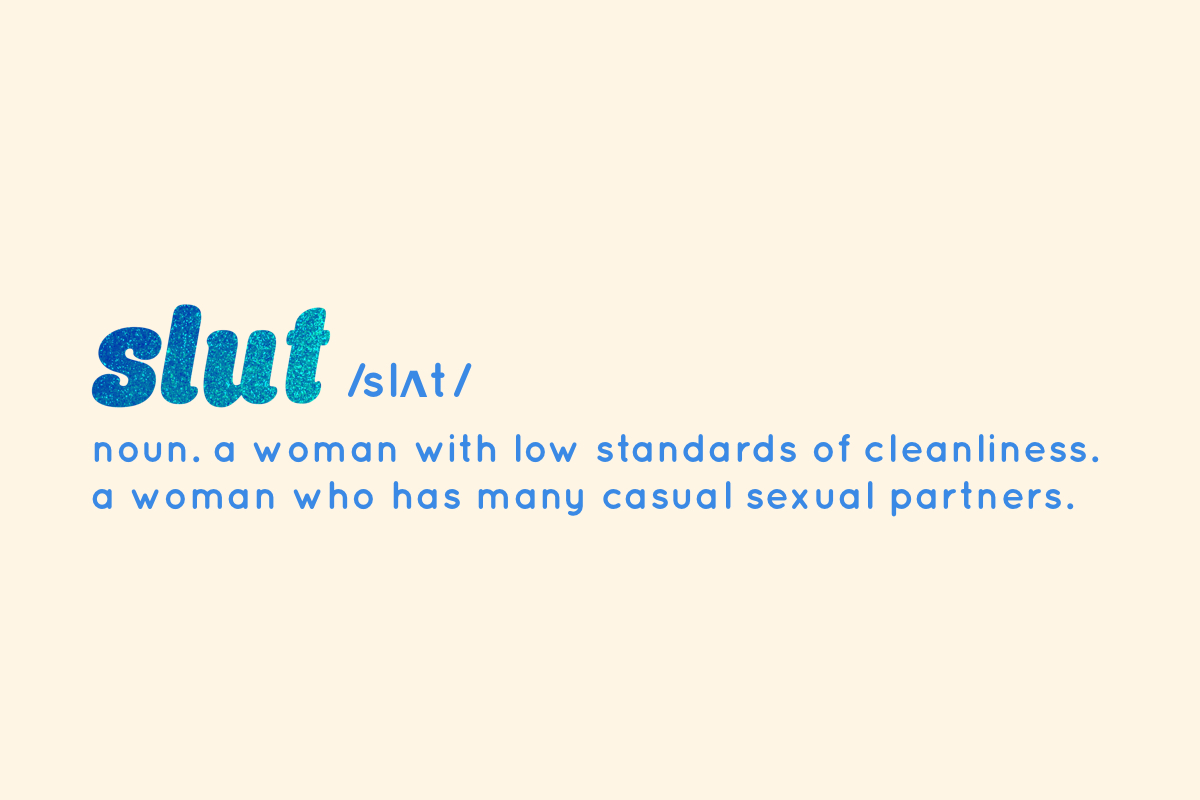The official Women's March website states: "The mission of Women’s March is to harness the political power of…
‘slut’
Origin of the Word12 October 2018
Slut. The word cuts through the air like a knife. It makes my ears ring, my stomach turn, and my fists clench. Five little letters that make up such a mighty word. Five little letters that are filled to the brim with our culture’s misogyny. While there are many terms used to disparage, discriminate, and attack women, the word slut, to me, cuts the deepest. In this piece, I aim to find out where the word ‘slut’ comes from and what it means to us today; why it is powerful and why it still hurts so much.
Language is dynamic. It evolves with society. Many of the words we use nowadays have replaced previous ones, were recently added to our vocabulary, or have found a new meaning over time. As language is used to maintain communication, it is adjusted according to society’s evolving needs. Language, therefore, reflects the prevailing culture and values. The vocabulary in a society speaks volumes about its social hierarchy. The amount of words that exist to glorify men and demean women, for example, reflect the status of women in our current world order.
There is an inextricable link between ourselves and language, as we use language to express our thoughts, and our thoughts, in turn, are influenced by existing language. We are usually completely oblivious to this fact and unconsciously perpetuate our society’s culture and values by solidifying widespread norms and stereotypes. Another thing that’s often overlooked is the power that specific words have on others, often offending individuals or minority groups. ‘Slut’ is one of those words. When used, it targets women. By using this word to criticise someone, we perpetuate the specific role of women.
But what does ‘slut’ even mean? The word’s origins are unknown, but the Oxford English Dictionary coined it as “a dirty, slovenly, or untidy woman” in the 1400s. Until the 20th century, the term ‘slut’ referred to poor women with low standards of cleanliness. ‘Slut’ was not only gendered, but also classed. According to society, the poor women it referred to should be more productive in the labour market.
It was not until 1966 that ‘slut’ became what we know it as today; a “woman who enjoys sex in a degree considered shamefully excessive.” This was around the time that women enforced their right to contraception (Griswold vs. Connecticut 1965) and claimed control over their own sexuality. Coincidence? I think not. As soon as women were able to embrace their sexuality without fear of pregnancy, the label of ‘slut’ arose to keep them in check. ‘Slut’ was a warning for women to adhere to female sexual norms.

To this day, ‘slut’ has no unanimous meaning. It can depend on the context, non-verbal cues, tone of voice, and what the word is used for. Most of the time, however, ‘slut’ is used to demean women by passing judgement on their sexuality, or even the lack thereof. The instances of that word being flung at me were situations where I did not show interest in a romantic/sexual contact. Rejection stings and makes people lash out. In wanting to put someone back in their place, these people refer back to the terms they know are the most hurtful.
While most words that describe female sexuality are derogatory terms used against them, there aren’t any commonly used ones that describe the same behaviour in men. ‘Male slut’ and ‘male whore’ are proof that these nouns are inherently directed at women. More common, however, are the terms gigolo, player, pimp, womaniser, ladies man, Casanova, playboy, Romeo, lady-killer, which basically have the same meaning, but with profound positive connotations. So while indulging in your sexuality is something that is glorified in men, the real or presumed sexual activity, or the behaviour that leads people to assume the sexual activity of woman, leads to ‘slut shaming.’ Slut shaming is an act of stigmatising a woman “for engaging in behavior judged to be promiscuous or sexually provocative.” This behavior includes actual sexual activity as well as that which, for whatever reason, may be presumed.
In recent news, slut shaming has also often revolved around a woman’s dress code. Both grown women and young girls are shamed for what they are wearing, as it could distract male classmates and teachers from their education. The shaming of women starting at an early age can have a big impact on the way they perceive not just their body, but also, their worth. By being sent home so as to not distract boys from their education, the girl is missing out on her own. The (subconscious) message received is that hers isn’t valued as much as her male counterparts is. Through slut-shaming, girls are taught that their bodies are sexual objects and a source of shame. They grow up with a huge focus on their appearance. We only need to take a quick glance at the female statistics on eating disorders, which say that three in four American women engage in disordered eating, to see why this is a big problem.
Rather than stopping the reinforcement of the portrayal of men as simple-minded, penis-driven creatures, continually affirming that “boys will be boys” with a shrug, we opt to depict women and girls as the protectors of virtue and chastity. “Society is so concerned over women and girls’ potential for promiscuity that we create dress codes, school curricula, even legislation around protecting women’s supposed purity.” There is a deeply rooted tradition in society of dividing women into two categories: the ‘good girls’ (virgins, mothers, wives) and the ‘bad bitches’ (those sexually desirable; the sluts). According to society, you are either or. The problem: you cannot separate the two. Women can be stereotypically feminine and embrace their sexuality. I know, mind-blowing! But society doesn’t seem to allow the idea of the ‘all-in-one-woman.’ Maybe women would be too powerful if they were allowed to be loving, caring, kind, understanding, and sexually empowered, and we wouldn’t want that now would we? Therefore the stigmas remain, and we play along, acting as if we were ‘just the right amount of sexually active and that we don’t really enjoy sex all that much — just as much as you want me to,’ so as to make men feel less threatened and to not be labeled a whore/bitch/slut.

There are endless instances where women are slut-shamed with the purpose of subordinating and silencing them. Being labeled a slut is a stigma that is very hard to shake off and therefore, is an effective tool to exert power over women. Unfortunately, this power tool still seems to work, as a large part of society is willing to be complicit. It is — and this breaks my heart — not just a tool used by men, but by many women as well. Being labeled a ‘slut’ is especially painful coming from fellow women, as these are people we often rely on having our backs. In the ‘battle of the sexes’ that has been imposed on us, women are supposed to be the ones on our side.
‘Slut’ hurts, as it is a “word that can, depending how it’s administered, insult the way you look, your basic moral fibre or every single romantic decision you’ve ever made,” which your friends and fellow women often know much about. Á la Mean Girls, many affluent, white, uni-aged women slut shame in order to maintain their social status. This brings us back to the original meaning, as a term directed mainly at white women on the lower steps of the social ladder. Slut shaming is used to punish anyone who is “trying to break into their social groups that they did not fit into,” reinforcing the social hierarchy by condoning the behavior of others and elevating themselves as being virtuous.
The willingness of both women and men to quickly judge and label women according to the clothes they’re wearing or an action they’re taking makes victim blaming after harassment/sexual assault a lot easier. It makes us ask what she was wearing the time she got assaulted. And say that ‘she was asking for it, walking around dressed up like a slut.’ It makes us believe she is lying about not wanting sex, because she’s slept with XYZ amount of men before, so she was in for it. Judging woman’s worth according to their sexuality justifies our rape culture. Language is a tool that, especially in cases like these, should be handled with care, as it can help decide the fate of those involved. When used carelessly, it can become an accomplice in the deed.
To combat the ancient idea of women being deserving of violence and harassment because of their behaviour, several initiatives were born. One of them is SlutWalk, a now transnational movement whose mission it is to reclaim the word ‘slut’ and relieve it of its stigma. Taken to the streets to protest rape culture, victim blaming, and slut shaming of sexual assault victims, this is one of the efforts made by women to taking away the power of the word ‘slut’ and making it their own by giving it empowering connotations. However, this is only possible once a certain degree of sexual privilege has been attained, which not all women feel like they have. Personally, I find nothing liberating about using a reductive and male-defined term to label my sisters with. And to those in the back calling out “it’s just a word, don’t take it so seriously,” I would like to kindly remind them of the fact that our thoughts are influenced by our language; what we hear around us influences the way we think. If we hear things over and over, we might start believing them too. I will also say that language replicates our thoughts and we hold the power to go against common perceptions by not acting as an accomplice to them.
While efforts have been made on a organisational level, with SlutWalk spreading across countries, there has not been a widespread change of heart when it comes to the definition and use of the word ‘slut.’ It’s origin lies in the description of a lazy (white) impoverished woman, but it is now used by women to women of other social status out of their ranks or by men and women to demean and shame (other) women. ‘Slut’ is a word so powerful it seems that fundamental structures need to be altered before our efforts of changing the meaning and connotations can even begin to take effect.
Words have power over those they are used against. And words say a lot about ourselves individually. When we choose to use a word we know is hurtful against someone else — what does it really say about us?
_
Original artwork created by Rae Tilly for YEOJA Mag. For more articles about the female body, click here.








